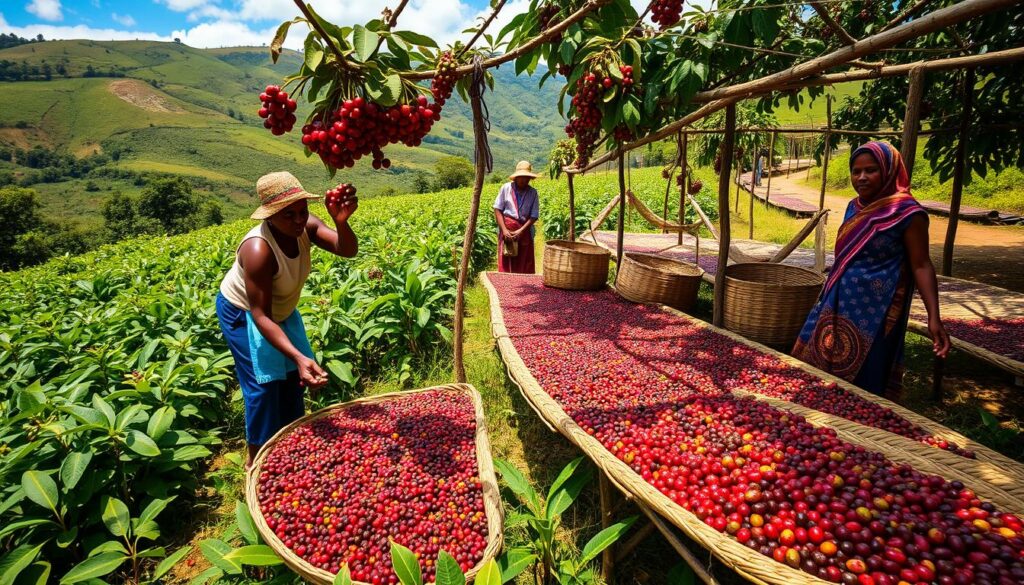Ever wondered why Ethiopian coffee is so special? It’s not just the vibrant fruit notes or the smooth flavor. It’s the whole experience that makes it stand out. Let’s explore what makes Ethiopian coffee so unique.
Key Takeaways
- Ethiopian coffee is renowned for its complex, fruity, and floral flavor profile
- It is sourced from the top 2% of coffee grown, specific USDA organic specialty grade Arabica
- Java Planet Organic Coffee Roasters offers a medium roast, organic, and pesticide-free Ethiopian Sidamo coffee
- The coffee is roasted in small batches to ensure the best possible flavors
- Java Planet emphasizes the health benefits and quality of their Ethiopian coffee
The Rich Heritage of Ethiopian Coffee
Ethiopia is where coffee first grew, and it has a deep cultural history. The coffee ceremonies are a big part of their social life. The country also plays a big role in the global coffee trade. Ethiopian coffee is known for its quality and tradition.
Birth of Coffee Culture in Ethiopia
Coffee started in the 15th century in Yemen. By the 16th century, it reached places like Persia and Turkey. But in Ethiopia, coffee culture really took off, making it the birthplace of coffee.
Traditional Coffee Ceremonies
The coffee ceremonies in Ethiopia are centuries old. They involve roasting, brewing, and serving coffee. These ceremonies turn into social events, celebrating the coffee’s aroma and taste.
Historical Significance in Global Coffee Trade
Ethiopian coffee is important in the global coffee trade. By the 17th century, coffee was popular in Europe. The Dutch grew coffee in Java, making it even more widespread. Today, coffee is a top commodity, and Ethiopia is a key player, known for its coffee varieties.
“Ethiopia is often recognized as the birthplace of coffee, with a rich cultural heritage surrounding its cultivation and consumption.”
Ethiopian Coffee Regions and Flavors
Ethiopia is where coffee first started. It has many coffee regions, each with its own special flavors. You’ll find everything from Yirgacheffe‘s bright taste to Sidamo‘s wine-like flavor. This makes Ethiopian coffee a true joy to try.
The Yirgacheffe area is famous for its light coffee with a lively taste and floral smells. On the other hand, Sidamo is known for its balanced coffee with flavors that can be fruity or spicy.
But there’s more to Ethiopian coffee than just Yirgacheffe and Sidamo. Places like Guji and Harrar offer their own unique tastes. Guji’s coffee is complex and balanced, while Harrar’s is known for its strong, dry-processed taste with hints of wine and fruit.
“Ethiopian coffee is renowned for its bright, fruity, and floral coffees with high acidity and complex flavor notes.”
Ethiopia exports over 3.5 million bags of coffee every year. This shows how much the country values its coffee heritage. From the careful selection at Coffee G.M.’s stations to the detailed tasting in their lab, every step is taken to preserve the unique flavors of each region.

Exploring Ethiopian coffee is a journey of flavors that will amaze you. Whether you love the bright taste of Yirgacheffe or the complex flavors of Guji, there’s something for everyone. Ethiopian coffee’s diversity will surely delight your taste buds.
Ethiopian Coffee Processing Methods
Ethiopia’s coffee heritage is rooted in its diverse processing techniques. Each method gives Ethiopian coffee its unique flavor. Let’s explore the world of coffee processing and see how it shapes Ethiopian coffee’s distinct character.
Natural (Dry) Processing Technique
The traditional natural processing method dries coffee cherries in the sun for up to two months. This long drying time creates a fruity, full-bodied coffee with a complex flavor. It’s often described as having a wine-like or sweet taste.
Washed Processing Method
In the washed processing method, the coffee cherries are pulped to remove the skin and pulp. Then, they are dried for up to three weeks. This makes uniform-sized beans perfect for roasting. Washed coffees have a clean, bright, and acidic flavor, unlike the fruity notes of natural processing.
Anaerobic Fermentation Innovation
The latest innovation in Ethiopian coffee processing is anaerobic fermentation. This method seals the coffee cherries in an oxygen-free environment. It creates unique flavors that are often described as complex, sweet, and intense. Anaerobic fermentation brings out intriguing and distinctive tastes in Ethiopian coffee.

Ethiopian coffee producers use different processing methods to meet various taste preferences. Whether you like the fruity notes of natural processing, the bright acidity of washed coffee, or the unique flavors of anaerobic fermentation, Ethiopia’s coffee will surely delight you.
Quality Standards and Certifications
Ethiopian coffee is known for its quality and sustainability. The country’s coffee industry follows strict standards and certifications. This ensures a top-notch coffee experience for fans everywhere.
One key feature of Ethiopian coffee is its USDA organic certification. Java Planet’s Ethiopian coffee, for example, is USDA certified organic. It also goes through third-party tests for purity and safety. This means coffee lovers can enjoy a healthier, more sustainable cup.
Ethiopian coffee exporters, like Coffee G.M, focus on quality too. They use advanced cupping labs and monitored warehouses. This keeps the coffee’s flavors and aromas perfect, giving a great taste.
The Ethiopian coffee grading system adds to the quality focus. Beans are sorted into different grades based on their quality. This means each cup offers a unique taste, pleasing all coffee fans.
Also, the Ethiopian coffee industry follows ISO 22000, a food safety standard. This helps them meet strict import rules in places like the US and EU. By doing this, Ethiopian coffee companies show they care about quality and safety.

Ethiopian coffee producers are committed to quality and sustainability. They aim to make a better coffee industry. As coffee lovers seek out Ethiopian coffee, these standards prove the country’s dedication to excellence.
Conclusion
Ethiopian coffee is a true gem in the global coffee market. It offers a unique taste experience rooted in centuries of tradition and expertise. From the rich heritage and diverse regional flavors to the meticulous processing methods, every aspect of Ethiopian coffee cultivation and production contributes to its exceptional quality.
Whether you enjoy it as a single-origin brew or as part of a carefully crafted blend, the allure of Ethiopian coffee beans is undeniable.
The high elevations, ideal climate, and traditional processing techniques employed in Ethiopia’s coffee farming contribute to the development of complex and nuanced flavor profiles. From the light, floral notes of Yirgacheffe to the bold, earthy tones of Harar, the diverse coffee cultivation in Ethiopia ensures that there is an Ethiopian coffee to suit every palate.
Also, the country’s commitment to sustainable coffee roasting and processing methods further enhances the quality and integrity of the final product.
As you explore the rich and diverse world of Ethiopian coffee, you’ll discover a taste that transcends the ordinary. It transports you to the heart of a centuries-old tradition. Whether you’re a seasoned coffee connoisseur or a newcomer to the world of specialty coffee, the exceptional quality and distinct characteristics of Ethiopian coffee are sure to captivate your senses and leave a lasting impression.







